Expert Tips for Automating Short-Term Rental Financial Reporting
Streamline your Short-Term Rental financial reporting with expert tips on automation. Enhance efficiency and accuracy on our blog.
July 12, 2024
Corey

Key Highlights
- Automating Short-Term Rental financial reporting can save you time and effort, allowing you to focus on growing your rental business.
- Accurate financial reporting is crucial for the financial health of your Short-Term Rental properties and for tax compliance.
- Choosing the right automation tools and integrating them with your booking platforms can streamline your financial reporting system.
- Automating income tracking and expense management can help you maintain accurate and organized financial records.
- Utilizing Short-Term Rental software solutions can provide you with comprehensive financial management and reporting capabilities.
Free Up Your Time: Expert Tips for Automating Short-Term Rental Reports
As a Short-Term Rental property owner, managing your finances can be a time-consuming and complex task. With the dynamic nature of the Short-Term Rental market and the reliance on third-party platforms like Airbnb and Vrbo, keeping track of rental income, expenses, and financial records can become overwhelming. However, by automating your Short-Term Rental financial reporting, you can streamline the process and save valuable time and effort.
We will discuss the basics of Short-Term Rental financial reporting, the importance of automation and accurate reporting, and the challenges that property owners face in managing their finances. We will also explore the process of setting up a financial reporting system, choosing the right automation tools, and integrating your booking platforms. Additionally, we will explore strategies for automating income tracking, managing expenses, and cash flow, and utilizing STR software solutions for financial reporting.
Understanding the Basics of Short-Term Rental Financial Reporting

To fully understand the importance of automating Short-Term Rental financial reporting, it's essential to grasp the basics of this process. Financial reporting refers to the collection, analysis, and presentation of financial data related to your Short-Term Rental properties. It involves keeping track of rental income, expenses, and other financial transactions and presenting this information in a clear and organized manner.
Maintaining accurate financial records is crucial for the financial health of your Short-Term Rental properties. Clearing’s innovative solution allows you to monitor your rental income, track your expenses, and assess the profitability of your rentals. You can generate key financial reports to make data-driven decisions and maximize your rental income
Managing a Short-Term Rental comes with exciting income, but also tax responsibilities. You'll need to report your rental income, keep track of rental income for each owner, and claim any deductions you may qualify for. Automating your financial reports makes tax season a breeze. You'll have all the documentation you need readily available, minimizing the risk of audits and penalties.
The Importance of Accurate Financial Reporting in STRs
Accurate financial reporting plays a vital role in the success of your Short-Term Rental business. It allows you to effectively manage your properties, make informed decisions, and ensure the financial health of your rentals.
Accurate financial reporting serves as a cornerstone for effective property management. Meticulous tracking of rental income and expenses provides a granular view of individual property performance. This transparency empowers data-driven decision-making. Early identification of potential issues, such as declining occupancy rates or cost increases, allows for proactive intervention to optimize rental operations and maximize profitability.
Furthermore, accurate financial reporting is essential for tax compliance. By maintaining accurate financial records and generating financial statements, you can easily calculate your tax obligations and take advantage of any eligible tax deductions. This not only ensures compliance with tax regulations but also helps you maximize your profitability and minimize your tax liability.
Key Financial Metrics Every Short-Term Rental Property Manager Should Monitor

To effectively manage Short-Term Rental properties, property managers must regularly monitor key financial metrics. These metrics include :
- Occupancy Rate: The percentage of space that is filled or being used, compared to the total amount available
- Average Daily Rate (ADR) : The average revenue earned per occupied room over a specific period
- Revenue per Available Room (RevPAR): The key metric in the hospitality industry used to measure a unit's overall revenue generation efficiency. It takes into account both the occupancy rate and the average daily rate (ADR).
- Net Operating Income (NOI): The financial metric used to assess the profitability of an investment property. NOI is calculated by subtracting all operating expenses from the property's total revenue.
Keeping a close eye on these figures helps in assessing the financial health of properties, optimizing pricing strategies, and maximizing profitability.
Setting Up Your Financial Reporting System
Setting up a robust financial reporting system is essential for automating your Short-Term Rental financial reporting. It involves choosing the right automation tools, integrating them with your booking platforms & property management system, and ensuring that you have a streamlined process in place for tracking income, expenses, and other financial transactions.
Choosing the Right Automation Tools for Financial Reporting
Choosing the right automation tools for your Short-Term Rental financial reporting is essential for effectively managing your rental properties and streamlining your financial processes. Here are some key factors to consider when selecting the appropriate tools:
- Look for an accounting system or software specifically designed for Short-Term Rental management. These tools often offer features tailored to your needs such as transaction tracking, financial statement generation, and tax reporting capabilities.
- Consider the compatibility and integration options with your chosen Online Travel Agencies (OTAs), such as Airbnb or Vrbo. Ensure that the automation tools can synchronize financial transactions seamlessly from the OTAs to your financial reporting system.
- Evaluate the user-friendliness and ease of use of the automation tools. Look for intuitive interfaces and features that simplify financial management tasks, such as categorizing income and expenses, generating owner statements and Profit & Loss statements (P&Ls), and tracking cash flow.
- Research the reputation and customer reviews of the automation tools. Look for tools that have positive feedback and offer reliable customer support.
Integrating Your Booking Platform with Financial Reporting Tools
Integrating your property management platform (PMP) with your financial reporting tool, such as Clearing, is crucial for automating your Short-Term Rental financial reporting. This integration allows for seamless synchronization of financial transactions, such as rental income and fees, from your OTAs and PMP, to your financial management software.
Here are some key benefits of integrating your booking platform with your financial reporting tools:
- Real-time financial data: Integration enables the automatic transfer of financial transactions from your booking platform to your financial reporting system. This ensures that your financial data is up-to-date and eliminates the need for manual entry or reconciliation.
- Streamlined reporting: With integrated systems, generating financial reports becomes a simple and efficient process. You can easily access comprehensive reports that provide insights into your rental income, expenses, and profitability.
- Ease of property management: Integration allows for centralized management of your property management platform and financial reporting system. This simplifies property management tasks and reduces the time and effort required to track financial transactions.
Automating Income Tracking for Short-Term Rentals

Automating income tracking is a key aspect of automating your Short-Term Rental financial reporting. By automating this process, you can accurately and efficiently track your rental income, eliminate manual data entry, and reduce the risk of errors.
How to Automate Income Tracking Effectively
Automating income tracking effectively is essential for accurate and efficient Short-Term Rental financial reporting. Here are some expert tips to help you automate income tracking effectively:
- Link your bank account to your financial reporting system: By linking your bank account, you can automatically capture rental income deposits, match expenses that occur outside of the PMP with their relevant category, asset, and homeowner, and eliminate the need for manual data entry. This ensures real-time and accurate tracking of your rental finances.
- Utilize rental management software: Choose rental management software (PMP) that integrates with your booking platforms (OTAs), such as Airbnb or Vrbo. This integration allows for seamless import of rental income transactions, eliminating the need for manual data entry or bulk payout splitting from your payment processor or Airbnb.
- Customize categorization of transactions: Categorization keeps your financial records organized and accurate. This allows you to easily track and reconcile payouts automatically from any OTA or PMP.
Best Practices for Recording and Categorizing Rental Income
Recording and categorizing rental income accurately is crucial for maintaining organized financial records and generating accurate financial statements. Here are some best practices for recording and categorizing rental income:
- Keep detailed records: Maintain a comprehensive record of all rental income transactions, including the date, amount, and source. Clearing's seamless integration with PMPs streamlines income capture, eliminating manual data entry and payout splitting, and ensuring accuracy.
- Categorize income by property: Categorize your rental income by property to track the income generated by each rental property separately.
- Use a consistent naming convention: Standardize naming convention to maintain consistent categorization throughout your financial reporting.
Managing Expenses and Cash Flow Automation
Managing expenses and cash flow is a critical aspect of automating Short-Term Rental financial reporting. By automating expense tracking and cash flow management, you can ensure accurate record-keeping, optimize your rental business's financial health, and minimize the risk of financial issues. Here are some expert tips for managing expenses and cash flow automation:
Automating Expense Tracking and Management
Automating expense tracking and management is essential for accurate and efficient Short-Term Rental financial reporting. Here are some expert tips to help you automate expense tracking and management effectively:
- Utilize expense management tools or software: Choose expense management tools or software that integrate with your financial reporting system, such as Clearing. These tools can automatically track and categorize expenses, eliminating the need for manual data entry and ensuring accurate financial records.
- Allocate expenses by category, homeowner, and property: Allocate your expenses by category, homeowner, and property asset to maintain organized financial records. This allows you to track the expenses associated with each rental property separately and generate accurate financial statements such as profit & loss statements.
- Automate reconciliations: Set up automated reconciliations for booking payments, utilities, and other recurring expenses. This ensures accurate bookkeeping and helps maintain a healthy cash flow for your Short-Term Rental business.
Strategies for Optimizing Cash Flow in Short-Term Rentals
Optimizing cash flow is essential for the financial health and success of your Short-Term Rental business. Here are some strategies for optimizing cash flow in Short-Term Rentals:
- Set competitive rental rates: Analyze the market and set competitive rental rates for your properties. This ensures a steady stream of rental income and helps maximize your cash flow.
- Minimize expenses: Regularly review your expenses and identify areas where you can reduce costs without compromising the quality of your rental properties. This helps improve your profit margins and enhances your cash flow.
- Implement effective occupancy management: Optimize your occupancy rates by implementing effective marketing strategies, offering competitive amenities, and providing exceptional guest experiences. This ensures a consistent flow of rental income and boosts your cash flow.
Utilizing Short-Term Rental Financial Management Software for Accurate Financial Reporting
Utilizing Short-Term Rental software for financial reporting is a game-changer for automating your financial processes and streamlining your Short-Term Rental business. With the right software, you can simplify your financial management tasks, generate accurate financial reports, and gain valuable insights into the financial performance of your rental properties. Here are some key benefits of utilizing Short-Term Rental financial management software for accurate and efficient financial reporting:
- Comprehensive financial management: Short-Term Rental financial management software offers features specifically designed for managing the financial aspects of your Short-Term Rental business, such as income bookkeeping and tracking, expense management, and financial statement generation.
- Streamlined reporting: By using software that integrates with your booking platforms and financial systems, you can generate comprehensive financial reports with ease.
- Tax compliance: Short-Term Rental financial management software often includes tax reporting capabilities, allowing you to easily generate the necessary documentation for tax compliance.
Introducing Clearing: A Top Software Solution for STR Financial Management
When it comes to Short-Term Rental financial management, Clearing offers a range of features and functionalities to meet the diverse needs of real estate investors and property managers in the Short-Term Rental space.

How Software Can Simplify Tax Reporting and Compliance?
Managing tax reporting and maintaining compliance for Short-Term Rental properties can be a challenging task. With fluctuating income, different tax regulations, and the need to keep track of expenses and deductions, it's easy to make mistakes. Software tools like Avalara can facilitate tax filings for project managers. It has a feature that automatically calculates occupancy taxes and other additional taxes, ensuring compliance with the law.
Advanced Reporting Features to Look For in Automation Software
When choosing automation software for Short-Term Rental financial reporting, it's important to look for advanced reporting features that can provide valuable insights into your financial data. Customizable reporting dashboards are a key feature to consider. These dashboards allow you to tailor reporting according to specific needs, making it easier to analyze and understand the financial performance of Short-Term Rental properties.
One important report to have is the profit and loss (P&L) statement. This statement provides a comprehensive overview of your rental properties' income, expenses, and net income. It helps you assess the profitability of your properties and identify areas for improvement.
Other useful reports to look for include cash flow statements, balance sheets, owner & management statements, and occupancy reports. These reports can provide a deeper understanding of your rental business' financial health and help you make informed decisions.
Customizable Reporting Dashboards and Their Benefits

Customizable reporting dashboards are a valuable feature in automation software for Short-Term Rental financial reporting. These dashboards allow customization based on their specific needs and preferences. This level of customization provides Short-Term Rental property managers with valuable insights into the financial performance of the rental properties they own or manage.
With customizable reporting dashboards, you can track and monitor key metrics such as occupancy rates, revenue, expenses, and net income. Compare performance across different properties or time periods, identifying trends and areas for improvement.
Transparency is another benefit of customizable reporting dashboards. Share reports seamlessly with property owners or investors, allowing for open and transparent communication about the financial health of their rental assets.
Generating and Analyzing Profit and Loss Statements Automatically
The profit and loss statement is a vital financial statement for the Short-Term Rental business. It provides a comprehensive overview of the income, expenses, and net income of the rental properties.
Analyzing profit and loss statements can provide valuable insights into the financial performance of their properties. It allows property managers to identify areas where expenses can be reduced or revenues can be increased, ultimately improving the profitability of their rental business.
Reducing Errors and Increasing Efficiency in Financial Reporting
Efficiency and accuracy are crucial in financial reporting for Short-Term Rental properties. Manual reporting processes are prone to errors and can be time-consuming.
Automation software eliminates the need for manual data entry, reducing the risk of errors caused by human input. The software can automatically capture and categorize income, expenses, and other financial data, ensuring accuracy in financial reporting.
In addition to accuracy, automation software increases efficiency in financial reporting. Financial management software with automation software can typically provide real-time access to financial data, allowing for better decision-making and timely reporting for owners or decision makers within the property management business.
Automation software also minimizes potential risks associated with manual financial reporting. With built-in checks and balances, the software can identify discrepancies in financial data between the PMP, OTAs, and bank account transaction feeds..
Common Financial Reporting Mistakes to Avoid
When it comes to financial reporting for Short-Term Rental properties, there are some common mistakes that should be avoided. Accuracy is key in financial reporting, and errors can have serious consequences.
One common mistake is failing to keep accurate financial records. Property managers should ensure that all financial transactions, including income and expenses, are properly recorded and categorized. This will not only help with tax compliance but also provide a clear picture of the rental business's financial health.
Another common mistake is not reconciling bank statements with financial records regularly. Reconciling bank statements ensures that all transactions are accurately recorded and helps identify any discrepancies.
Lastly, avoid mixing personal, owner, and business expenses. It's important to keep personal, owner, and business finances separate to maintain accurate financial records and comply with tax regulations.
Tips for Ensuring Accurate and Timely Financial Reports

Accurate and timely financial reports are essential for Short-Term Rental businesses. Here are some tips to ensure the accuracy and timeliness of your financial reports:
- Maintain organized and up-to-date financial records: Keep track of all income, expenses, and transactions in a systematic manner. Regularly reconcile your bank statements with your financial records to identify any discrepancies.
- Use automation within financial management software: Automation within financial management software can streamline your bookkeeping processes, ensuring accurate and timely financial reporting. It eliminates the need for manual data entry and reduces the risk of errors.
- Set a regular reporting schedule: Establish a routine for generating and reviewing your financial reports. This will help you stay on top of your financial performance and address any issues promptly.
- Seek professional assistance if needed: If you're unsure about certain aspects of financial reporting, consult with an accountant, tax expert, trust accounting expert, or financial advisor. They can provide guidance and ensure compliance with financial regulations related to Short-Term Rentals.
Empower Your Growth: Take Control of Your Short-Term Rental Finances
When it comes to Short-Term Rental financial reporting, automation is a game-changer. By embracing the right tools and practices, you can streamline income tracking, expense management, and overall cash flow. These initiatives not only save time but also enhance accuracy. Look for software solutions that offer customizable financial statements and simplify tax compliance.
Remember, errors can be costly, so prioritize accuracy and timeliness in your financial reporting. With automation on your side, you can efficiently manage your finances for your Short-Term Rental business without the need for an expert level finance background.
Elevate your financial reporting game with Clearing and maximize your property's potential!
Clearing is a Financial Technology Company, not a bank.




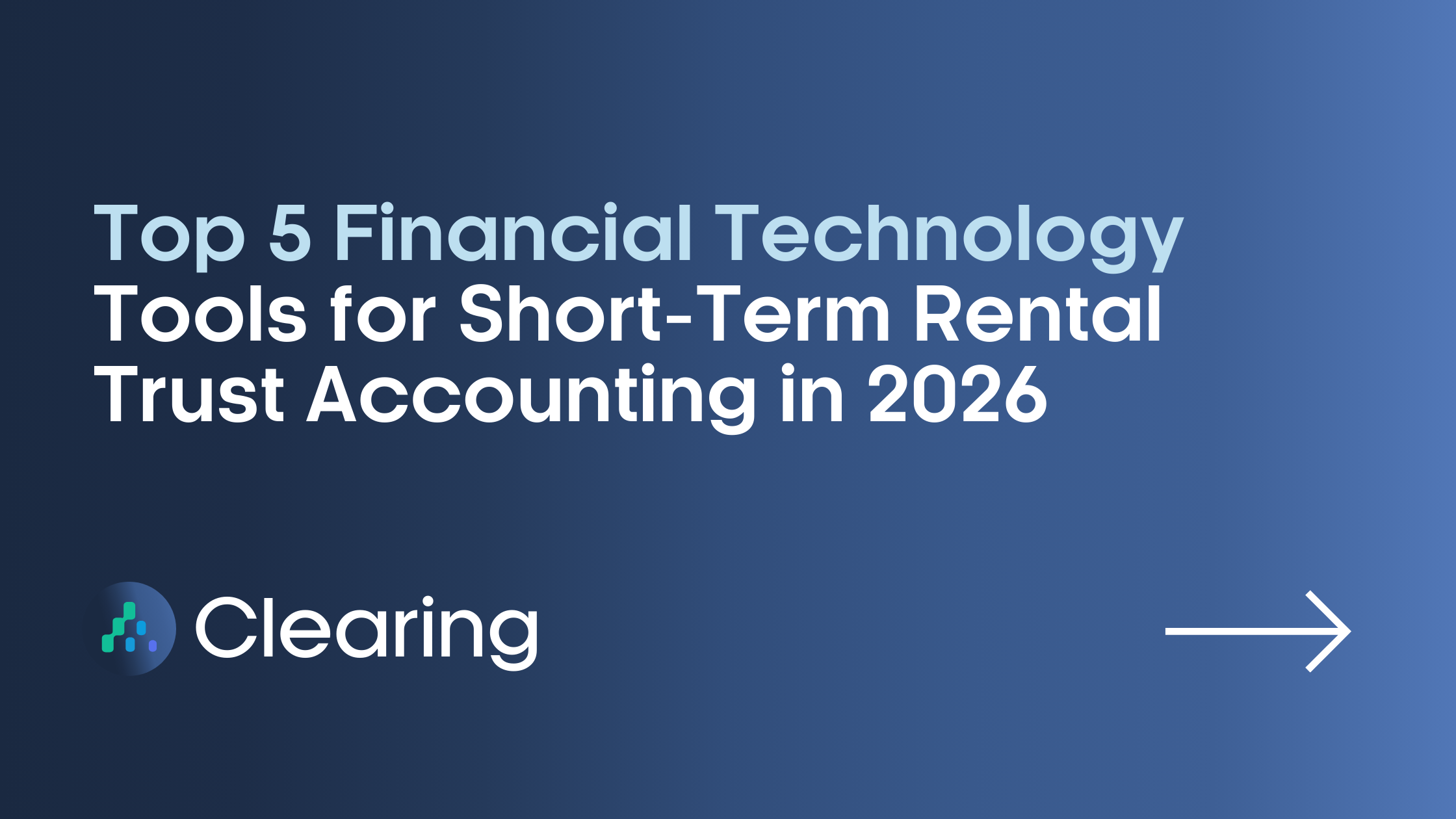
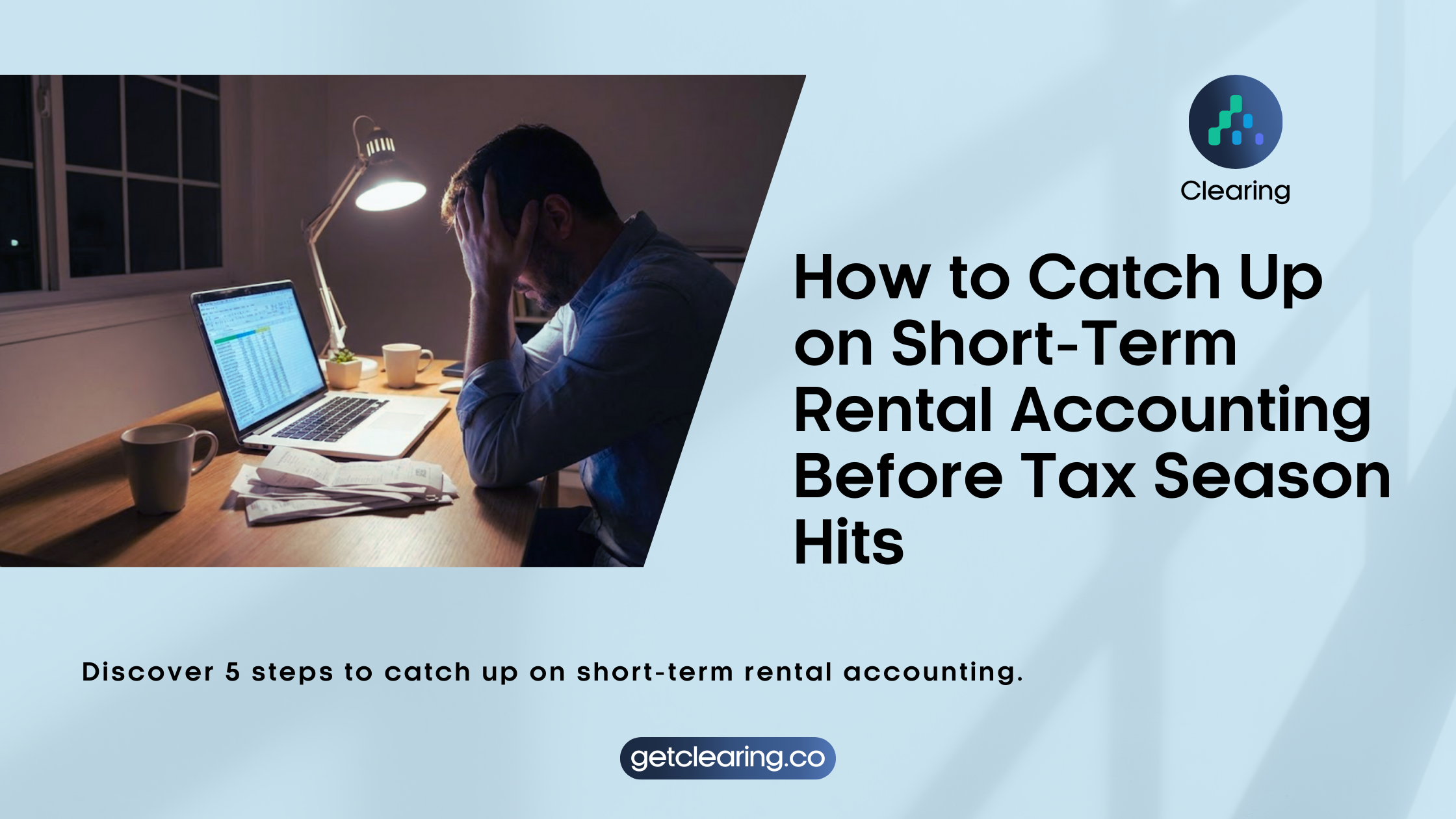
.png)
.png)
.png)
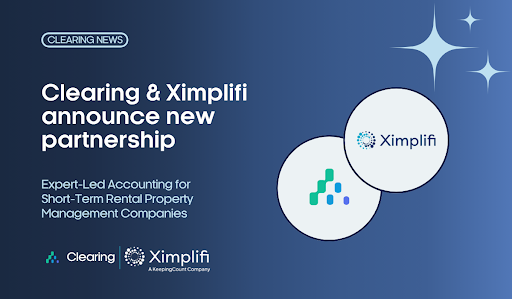
.png)
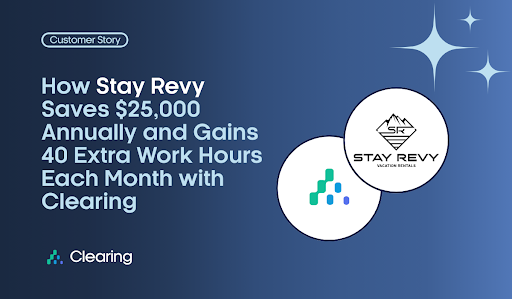
.png)
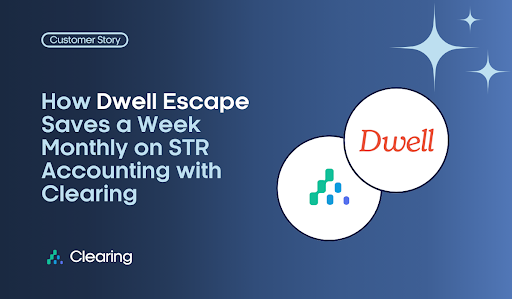
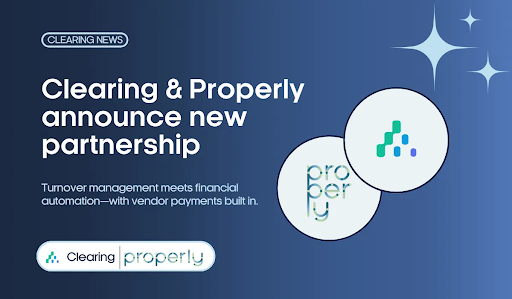
.png)
.png)
.png)
%20(1).png)
%20(1).png)
%20(1).png)
.png)
%20(2).png)
%20(1).png)
%20(1).png)
.png)

.png)
.png)
.png)
%20(1).png)
.png)
.png)
.png)
.png)
.png)
.png)
.png)
%20(1).png)
.png)
.png)
.png)
%20(1).png)
%20(1).png)
%20(1).png)







.jpg)
%20(1).png)
%20(1).png)
%20(2).png)
%20(1).png)

%20(1).png)
%20(1).png)
%20(1).png)



%20(1).png)
%20(1).png)
%20(1).png)
%20(1).png)
%20(1).png)


%20(1).png)
%20(1).png)
%20(1).png)
%20(2).png)
%20(2).png)



%20(2).png)


%20(2).png)
%20(1).png)
.png)


%20(2).png)
%20(2).png)

.jpg)
.png)
.png)
.png)



.png)

.png)